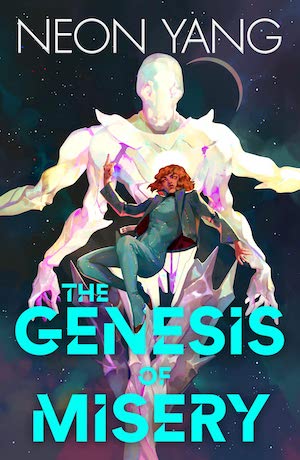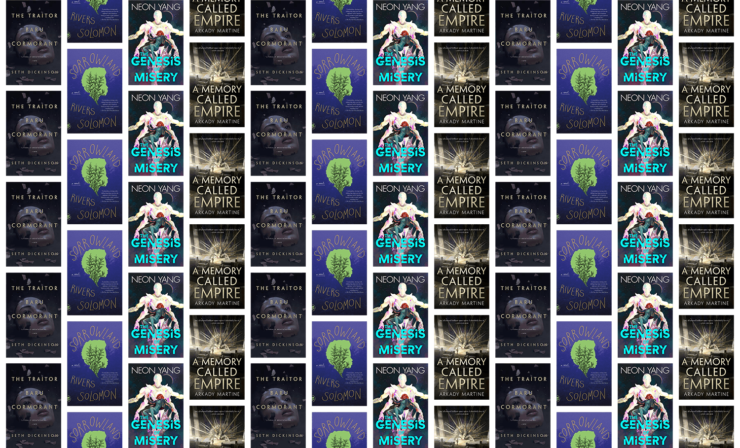The writing of The Genesis of Misery spanned a good number of years, from 2018 onwards. The backdrop of those years saw a blooming sea of conspiracy and misinformation. Groups of adherents bled into and fed one another, and their beliefs were as nonsensical as the consequences of those beliefs were horrific. Families estranged, insurrection attempted, deaths untold from disease. The question of what made people believe in things that patently reject common sense became increasingly urgent. I found myself reading too much about these neo-cults, and thinking too much about those who had fallen prey to it, and these thoughts crept into the novel I was drafting and re-drafting.
For better or for worse, we live in the age of information. Never in human history has so much information been so easily accessible to so many people. Anything you want to know more about—the past, the present, the future—is a mere Internet search away. At the same time, we live in the age of disinformation. Never in history has so much untruth been so easily accessible to so many people. Anything you want to be lied to about—the past, the present, the future—is a mere Internet search away. Which gives the state of the world too much credit, as if disinformation were something we have to actively seek out, and not something aggressively irradiated into our consciousness. It’s everywhere, in all the places we socialize and spend time with people—friends, loved ones, colleagues. Microplastics in the fabric of knowledge. Inescapable. Inevitable. As January 2020 happened, and as the pandemic progressed, it became clear to me we were seeing a new era of conspiracy theory and the rise of a new kind of Internet-fuelled cult, one with deadly consequences.
I have always had a morbid fascination with cults and cult-like groups, particularly in the outlandish beliefs held and self-justified by their members. Particularly the kinds that fly so much in the face of reality—that the earth is flat, or that vaccines don’t work and it’s the government secretly microchipping us. But it’s so easy to make these judgements from outside looking in, untouched by the pressures that turn the loose sands of dissatisfaction and misgiving into unyielding quartz. After all, nonsensical belief is not the sole domain of the tinfoil-hat wearers. For so many years so many have believed in soft delusions such as “trickle-down economics” and “binary gender roles” and such things were never questioned. Thinking you are too smart to fall for cult-like thinking, in fact, renders you more vulnerable to the influence of cult-like thinking, a tidbit often shared by those who fell into conspiracy theory, but managed to escape.
In The Genesis of Misery, the titular Misery finds themself the center of an ideological war between the Heretics and the Faithful, two spacefaring factions that violently disagree on the existence of divinity. A widely-discredited prophecy says Misery will bring the Faithful to victory. Misery doesn’t believe in all that nonsense, but what if they use it to their advantage? What if they could make what was discredited, credible again? I wanted to explore how belief could be wielded as a weapon, and the power it has in controlling people. I wanted to explore the overlap between the tactics of what we consider ‘cults’ and what we consider ‘oppressive institutions’. Where does cult end, and totalitarianism begin?
Using information and thought as a means of control is a theme richly worked in genre. In Seth Dickinson’s incandescent The Traitor Baru Cormorant, the titular Baru grows up on an island which is slowly taken over by a foreign empire, the Empire of Masks. But the Empire does not invade with soldiers;rather, they employ the tools of trade and finance to take over Baru’s homeland, selling them technologies and creature comforts at the cost of their culture and social fabric. After the homophobic Empire kills one of her fathers, Baru Cormorant vows to destroy it the Empire by joining it and eating it from the inside out, but her journey to accumulate the power she needs sees her betray her comrades and sacrifice the woman she loves, carrying out the will of the Empire she claims to despise. The conniving puppet master Cairdine Farrier, an agent of the Empire disguised as a simple merchant, tells the young Baru as he recruits her for his purposes: “Money is only one kind of power. Faith is power, too. Love is power.” Material conquest can be reversed, but a conquest of the mind is absolute. Once you have changed your mind about something, it is very hard to change it back.
Therein lies the tenacity of cults and the power of propaganda. Psychologically, humans are deeply reluctant to give up belief in something they have latched on to, even in the face of overwhelming evidence otherwise. Particularly so if it is a conviction they feel like they have come to independently, rather than a message openly pushed down their throats. Especially so if it runs counter to information that is fed directly to them. Hence the insidiousness of QAnon, which encourages its adherents to “do the math” from drip-fed information. Hence anti-vaxxers ignoring all of medical science for absolute quackery. Hence, “sheeple”. In The Genesis of Misery, Misery realizes their deceptions will go down easier if they subtly point people down the path and let them find the destination themselves. It’s a fairly effective tactic, and it even works on Misery themself.
Buy the Book


The Genesis of Misery
At the core of it, disinformation thrives upon dissatisfaction. Unhappiness with the status quo leaves a gap that corrupting thought can wriggle into. In Sorrowland by Rivers Solomon, the protagonist Vern is an escapee from a cult that offered itself as a balm and a weapon against the oppression of white man. The bloody history of American anti-Blackness and its continuing structural racism undeniably real, but in Solomon’s constructed universe it gets turned into a weapon to justify unspeakable atrocities. Reverend Sherman, the cult leader, controls every aspect of the cultist’s lives, up to and including tying them down at night, and covering up the murder of an escapee. Married to the Reverend against her will, Vern flees the compound to raise her children in the wild, but a life alone outside of the cult’s confines is riddled with hardships. Solomon writes,
“Reverend Sherman exploited it often, fulfilling a wanderer’s desire for belonging, validation, purpose. She’d seen how newcomers to the compound fell into the fantasy of perfect love and perfect truth he offered.”
Disinformation preys on alienation and anxiety. It gives explanation for why you feel as bad as you do. Something is wrong with society, and we have the answer. It tells you that you are not alone. It provides you a family of like-minded people, united in enlightenment. Rejecting these tenets means rejecting community for isolation and estrangement, once again. It’s a difficult ask.
With all that in mind, it’s not a surprise that people cling to beliefs and institutions they are emotionally invested in, even when those things are actively causing them harm. It doesn’t make logical sense, but humans are weaker to emotion than they are to logic. Arkady Martine’s A Memory Called Empire poses the question of what happens when one loves the colonizer, even when that love has deadly consequences. Mahit, the protagonist, is the ambassador of Lsel, a small independent mining station, sent to the capital city of the Teixcalaan empire as a replacement for her dead predecessor. She holds great admiration for the dominant empire, even as it threatens to swallow her beloved home. It is a love she shares with the late ambassador she replaces, who was the Emperor’s lover, and promised him their forbidden memory-transfer technology in exchange for not annexing Lsel. But this affair gets him murdered, and Mahit in turn becomes a target. She spends her whole time in the city fighting for her life. In one poignant scene, Mahit watches her chaperone, a Teixcalaan native empire, has a poetry battle with her friends, and realizes that, no matter how much she studies the culture of empire, she will never truly be one of them. It’s a turning point, where she realizes that empire will never love you back.
So—is there hope for those in the grip of oppressive belief? At the end of A Memory Called Empire, Mahit walks away from the capital and returns home. And I write the essay against the backdrop of the Alex Jones trial and the unravelling of some of the most heinous lies over the years, and getting his just desserts. Perhaps all we can do is to put faith into truths stronger than fiction.
Neon Yang (they/them) is a queer non-binary author based in the UK. They have been nominated for the Hugo, Nebula, World Fantasy, Lambda Literary, Ignyte, and Locus Awards, and their Tensorate series of novells was an Otherwise Award Honoree. In previous incarnations, Neon was a molecular biologist, a science communicator, a writer for animation, games and comic studios, and a journalist for one of Singapore’s major papers. The Genesis of Misery is their first full-length novel.










